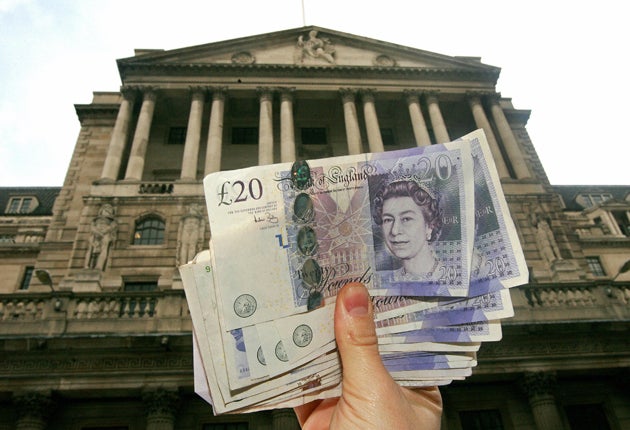Cash, shares, child trust funds... What's the best way to invest for grandkids?
A little put away now can grow into a lot in the future. Chiara Cavaglieri and Julian Knight report

Everywhere grandparents turn, it seems, they are being told that the financial future of their grandchildren is uncertain.
They face rising university fees, house prices out of reach, minuscule interest on savings and shrinking pension provision. All in all, growing up and moving through adult life has never been so expensive – no wonder grandparents want to give a helping hand through savings and investments.
According to Saga, 1.8 million grandparents are currently putting money aside for their grandchildren. But in a low-interest rate environment and with investment returns patchy at best, what options are available for grandparents looking to give their loved ones a head start in life?
Savings accounts
Savings for children are not automatically exempt from tax, and children, just like adults, have an annual personal allowance. For this year, that allowance is £6,475 but most children are unlikely to reach that limit, so parents can fill out an R85 form to ensure that interest is paid gross – without the automatic tax deduction.
Several specialist children's savings products are available. Halifax pays 6 per cent on its Children's Regular Saver, fixed for one year, but deposits must be at least £10 and no more than £100 per month. Also, withdrawals or missed payments will result in the interest falling to just 1.05 per cent.
Grandparents wanting to lock away a lump sum can opt for a bond for a fixed rate of interest over anything from six months to five years. Generally, a more restrictive account will attract higher rates of interest.
National Savings' Children's Bonus Bonds are another option and can be opened by any adult for a child under the age of 16. A lump sum of up to £3,000 can be added per issue, in £25 instalments. For five years, the bond earns a fixed rate of interest, after which there is a guaranteed bonus and the parent, who controls the bond until the child reaches 16, can decide whether to cash it in or leave it invested. All interest and bonuses are exempt from tax.
Child Trust Funds
Children born after 1 September 2002 will already have a child trust fund (CTF) set up in their name. Grandparents, as well as any other relatives or friends, can jointly contribute up to £1,200 into a child's CTF each year, and any interest is tax free. "As a concept child trust funds tick a lot of boxes; they're tax efficient, relatively uncomplicated, and can accept regular savings or smaller lump sums," says Dennis Hall, the managing director of Yellowtail Financial Planning.
Cash CTFs operate as a standard savings account, with no real risk and a steady, if minimal growth. The amount a child would receive from a shares and stakeholder account is dependent on the performance on shares and bonds. Most financial advisers are hesitant to recommend cash over the full 18-year period, as stakeholder accounts are expected to withstand any stock market volatilities and offer much better returns over such a long period of time.
For grandparents wary of the risky nature of a non-cash fund, stakeholder accounts do offer some protection. Importantly, the money in the account will be moved out of shares into safer cash investments, a process known as lifestyling, once the child turns 13.
But CTFs are not without their drawbacks. "The child gets control of the fund at age 18, university fees or longer-term savings may not be a high priority," says Mr Hall.
Share based investments
Many grandparents will be hoping to help their grandchildren at a later stage in life, typically when they reach university age. Those with time on their side should consider share-based investments.
Shares cannot legally be owned by under 18s but grandparents can save on their behalf and identify their grandchild as a beneficiary, or hold the investment in trust for the child until they reach adulthood. Grandparents can pick individual shares or go for investment trusts and unit trusts which pool money from other investors to buy shares in different companies.
"These are an ideal form of savings for the long term. Most provide the option of regular monthly saving and they're tax efficient because any profit is offset against the child's capital gains tax allowance – which is £10,100 this year," says Philip Pearson, a partner at advisors P&P Invest.
When parents are investing on their children's behalf, any income over £100 will be taxed at the parent's tax rate, but this does not apply to money given by grandparents. However, there may be inheritance tax issues.
Stakeholder pensions
Grandparents can also set up a stakeholder pension and invest up to £2,880 a year on behalf of a child. The Government tops up the contribution with tax relief. "The extremely long investment timescale means there is great potential for high levels of growth created by compounding over many years," says Gordon Bowden, the director of advisers Quainton Hills. However, stakeholders are very inflexible. There is also the danger that pension rules will change dramatically over the years.
Subscribe to Independent Premium to bookmark this article
Want to bookmark your favourite articles and stories to read or reference later? Start your Independent Premium subscription today.

Join our commenting forum
Join thought-provoking conversations, follow other Independent readers and see their replies